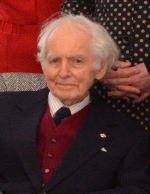Melvin Day facts for kids
Quick facts for kids
Melvin Day
|
|
|---|---|

Day in 2013
|
|
| Director of the National Art Gallery | |
| In office 1968–1978 |
|
| Preceded by | Stewart Maclennan |
| Succeeded by | Luit Bieringa |
| Government Art Historian | |
| In office 1978–1984 |
|
| Personal details | |
| Born | 30 June 1923 Hamilton, New Zealand |
| Died | 17 January 2016 (aged 92) Wellington, New Zealand |
| Cause of death | Stroke |
| Spouse |
Oroya McAuley
(m. 1952; died 2014) |
Melvin Norman "Pat" Day (born June 30, 1923 – died January 17, 2016) was a famous New Zealand artist and someone who studied and wrote about art history. He was also known as "Pat".
Contents
Early Life and Art School
Melvin Day was born in Hamilton, New Zealand. When he was eleven, he started art classes on Saturdays at the Elam School of Art. This school is part of the University of Auckland. He learned from talented teachers like Archie Fisher and Lois White.
In 1939, he became a full-time student at Elam. He earned a diploma in fine arts two years later. During World War II, Day served in the New Zealand Army and then the Royal New Zealand Air Force. Because he was good at drawing, he helped create maps and landscape views.
Life as an Artist and Educator
In 1952, Melvin Day married Oroya McAuley. They lived and worked in Rotorua for a few years. Day taught art and continued to paint there. In 1954, he moved to Wellington.
In Wellington, he studied for a Bachelor of Arts degree at Victoria University of Wellington. At the same time, he taught at Hutt Intermediate School. From the late 1950s, his art was shown in many exhibitions across New Zealand. His work was even featured in a big art show in London in 1961.
Studying in London
In 1963, Day went to London to study at the Courtauld Institute of Art. Here, he became very interested in the Italian Renaissance artist, Paolo Uccello. Uccello's paintings were known for their exact geometric shapes. Day started creating his own modern art pieces inspired by Uccello's style. These became known as his famous "Uccello series."
In 1964, Day took part in another exhibition in London called "Young Commonwealth Painters." Other New Zealand artists like Ralph Hotere also had their work shown there. After finishing his degree with honours, he taught at art schools in London. He returned to New Zealand in 1968.
Director and Historian
In 1968, Melvin Day became the director of the National Art Gallery of New Zealand. This gallery is now part of the Museum of New Zealand Te Papa Tongarewa. During his time as director, he bought important paintings by artists like Colin McCahon and Don Binney. He recognized their talent before their work became widely famous.
In 1978, he was appointed the government's art historian. Even while working as director, Day continued to paint a lot. Two special exhibitions of his work were held during this time. One was in Dunedin in 1970, and another was in Lower Hutt in 1971.
Later Exhibitions and Recognition
Since then, Melvin Day's paintings have been shown in many solo and group exhibitions. A large exhibition called Melvin Day – Full Circle was held in Wellington in 1984.
In 1990, he was asked to paint a portrait of Donald McIntyre for the New Zealand Portrait Gallery Trust. In 2011, Melvin and Oroya Day gave this portrait to the New Zealand Parliament.
Melvin Day is seen as a very thoughtful painter. His art often explores ideas from different periods of art history. He looked at both the meaning and the shapes in art. In 2003, Day was given a special award, the Companion of the New Zealand Order of Merit. This was for his great contributions to painting and art history.
In 2004, another major exhibition, Melvin Day – Continuum, was held in Wellington. It then traveled to Rotorua. In 2005, his exhibition Tracing Tasman opened the newly improved Nelson Provincial Museum.
In 2007, Melvin Day worked with a French writer, Frédéric-Yves Jeannet. He created a series of artworks inspired by Vivaldi's music. These works were shown in galleries in Blenheim, Whakatane, and Wellington.
In 2009, Day traveled to Fiordland with other artists like Nigel Brown. They went to see the landscape that inspired Captain Cook's artist, William Hodges. Their journey was made into a film called The Waterfall.
Melvin Day passed away in Wellington on January 17, 2016. His wife, Oroya, had passed away in 2014. She was also an art historian and helped start the Katherine Mansfield Birthplace Society.
Legacy
Melvin Day's artworks are kept in many important art collections. These include Te Papa Tongarewa, The Dowse Art Museum, and the Auckland Art Gallery. His paintings are also found in international collections.
 | John T. Biggers |
 | Thomas Blackshear |
 | Mark Bradford |
 | Beverly Buchanan |

